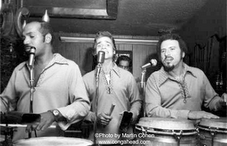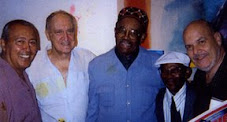
Machito would begin the Rumba Matinees at La Conga singing his theme song that immediately identified his Afro Cuban roots. This was a dividing departure from the “Allá en el Rancho Grande” format that Anglos had become accustomed to hearing from orchestras. Machito blazed a trail, along with Noro Morales who preceded him at La Conga but who played more bolero and a more toned-down rumba, so that when Machito broke onto the scene, it was a momentous turn in sound: more the real thing that had been waiting in the wings.
Mario Bauzá’s insistence on a jazz hookup is understandable in terms of improved Anglo public exposure and money-wise, as well as a musical innovation. But Machito had his ears and his pulse tuned to the minority, his loyal following at La Conga that barely tolerated the mixture that was forced upon them by Bauzá. I recall the dancer and listener reaction around the room as Mario and Machito acted uncomfortably with each other on the bandstand, with Mario struggling to get the band behind his efforts as he stood off to the right-hand side, leading rather desperately (and rather obviously to us all) while Machito stood in front of the band playing along with his maracas with cool confidence in his Afro-Cubanos. Perhaps the orishas were on his side, and he seemed to know it—and so did Mario.
Machito correctly understood the reaction of befuddled dancers when Mario sprang “Tanga” on them. They had come to dance, not to stumble over Latin jazz. Jazz is great for the brain and the ear, but Latin is for the feet and the heart. Minus dance floors, the Blue Note, Birdland and the old Granada in the Village never enjoyed the crowds of the Copa.
One can call jazz sophisticated or (forgive me) a subtle, contrived snobbery that is at home in vaporous, smoke-filled darkness, demanding respect from its audience. Latin is for extroverts, for public spectacles and displays of exuberance. It applauds mobile ability—but where would it be without the dexterity of all the musicians? Jazz is musical embroidery, ingenious, involved in amazing trickery. Both are infectious with shock potential and as creators of artifice, both can cleanse us of demons while employing intriguing style. Both transmit a lingering presence—a rush, a charge, an afterglow, a satisfaction like an intoxicant that enlarges our spirits.
Perhaps most of all, jazz, Latin, Afro, et al, are best described as testimonials to one’s artistic and very human individuality. They are demonstrations of mankind’s God-given sensitivity, and of his struggle to excel. Music is not only a fact of the natural world—as sentient creatures with creative instincts, it is embedded in all of us, like love.
When I met Graciela in 1941, playing with Anacaona in front of the Capitolio, I knew that her Afro sound would someday reach Broadway. It was Cugat and Miguelito Valdez who brought “Babalu” to America—first heard at the Beachcomber in Miami Beach, in ’41 and then in ’42 at the Waldorf-Astoria—and first teased the ears of those of us who wanted more. Machito filled that gap when he shook off Cugat’s refinement, which had constrained the authentic (often nañigo) roots, and finally pioneered the remarkable Afro-Cubano phenomenon. We can compare Cugat’s motivation, a financial consideration, with Arthur Murray’s manipulation of the authentic rumba, as well as Bauzá’s surrender to jazz influences. Music sounds “right” when separated from money, as in the desperately poverty-stricken areas of Africa where it comes from the soul and not from the pocket. That holds true for jazz as well as for Afro. All musicians are brothers, but not all music is harmonious. Music is a large familia that doesn’t always get along, even for reasons other than money. It is saddest when music itself, to soother of beasts, is the cause and the public suffers.
The last time I sat with Machito and spoke of the happy times we knew, it was at Roseland where he, in the late ’70s, played to a small crowd of mostly senior citizens and old widows—the music that they could manage to dance to. The gloom that was evident weighed on us. Latin jazz and hip-hop would be coming to Broadway. Bauzá had triumphed—but back in New Orleans, you can still hear some of the folks singing “Give me back that old time rhythm.”


No comments:
Post a Comment